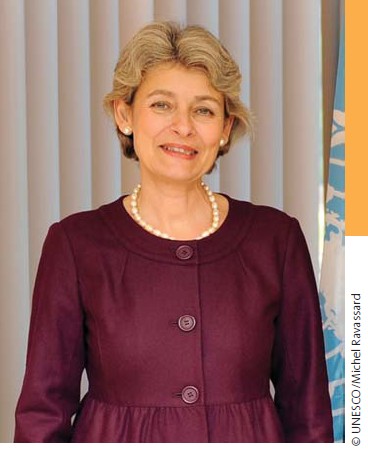教科文组织总干事在国际扫盲日上的讲话
这与我们现处的不稳定的时代有着很大的相关性。全球充斥暴力的国家,其扫盲率也往往是世界最低。冲突仍然是阻碍实现全民教育目标和千年发展目标的主要障碍。全球超过40%的初等教育阶段辍学人口来自受冲突影响的国家。

联合国教科文组织总干事伊琳娜·博科娃在国际扫盲日上的讲话,2012年9月8日
? 今年,国际扫盲日特别关注扫盲与和平之间的重要关系。
这与我们现处的不稳定的时代有着很大的相关性。全球充斥暴力的国家,其扫盲率也往往是世界最低。冲突仍然是阻碍实现全民教育目标和千年发展目标的主要障碍。全球超过40%的初等教育阶段辍学人口来自受冲突影响的国家。
我们决不允许冲突剥脱儿童和成人接受扫盲的重要机会。扫盲是人的基本权利,也是所有教育和终身学习的基础。扫盲改变人的生活,帮助人们明白地做出选择,增强人们应对变化的能力。长期的和平依赖于公民扫盲发展与全民教育的公平。面对全球多个地区的政治动荡和暴力升级,扫盲必须成为各国建立持久和平的优先事项。
和平与可持续发展是相互倚赖的,促进和加强两者的共同发展至关重要。扫盲同时也是发展的加速器,促使社会更加包容和可持续地发展。扫盲课程可以成为未来发展战略的主要因素,为所有人提供机会和技能。所有这些对实现全民教育和千年发展目标极为重要。
2015年扫盲目标的实现已经取得很大进展,但是未来还面临诸多挑战,需要国际社会更强有力的决心,才能实现我们于2000年在达喀尔做出的承诺。据联合国教科文组织统计,目前全球成人文盲人口数为7.75亿,其中1.22亿为青年文盲。总文盲人口中妇女和儿童数量接近三分之二。他们是未来巨大的潜力,却正在流失。
我们可以结束这样的恶性循环。我们都愿意将世界变成一个更有文化的地方。在我们临近实现2015年全民教育目标终期时,我们获得了新的动力。教科文组织已通过不懈的努力将教育和扫盲推到了全球发展日程的首位。联合国秘书长的“教育先行”倡议将于本月下旬正式启动,这将成为一个有力的高级别的支持平台。
今年教科文组织国际扫盲奖的获奖者展示了通过成功开展扫盲所取得突出的成绩。这些案例切实地展现了扫盲在促进人权、性别平等、解决冲突和促进文化多样性中所发挥的中心作用。
今天,我呼吁各级利益相关者加强伙伴合作关系,提高扫盲质量。这对促进和平价值、人权和公平价值融入扫盲课程至关重要,而扫盲也将真正成为增强能力的工具。扫盲将带来和平与发展。让我们共同努力,让这一天更早到来。

伊琳娜·博科娃
Message from Irina Bokova, Director-General of UNESCO, on the occasion of International Literacy Day, 8 September 2012
This year, International Literacy Day has a special focus on the fundamental relationship between Literacy and Peace.
This has tremendous relevance in our current turbulent times. Countries with patterns of violence have some of the lowest literacy rates in the world.
Conflict remains one of the major barriers to the attainment of the Education for All (EFA) goals and Millennium Development Goals (MDGs). Conflictaffected
countries are home to over 40% of the world’s out-of-school population of primary school age.
We must not allow conflict to deprive children and adults of the crucial opportunity of literacy. Literacy is a fundamental human right, and the
foundation of all education and lifelong learning. Literacy transforms the lives of people, allowing them to make informed choices and empowering individuals
to become agents of change. Lasting peace depends on the development of literate citizenship and access to education for all. Amidst political upheaval and
escalating violence in many parts of the world, literacy must be a priority in the peace-building agenda of all nations.
Peace and sustainable development are interdependent, and it is crucial for the two to develop and strengthen simultaneously. Literacy is also a development
accelerator, enabling societies to grow more inclusively and sustainably. Literacy programmes can become a key component of future development strategies,
opening new opportunities and skills for all. All of this is vital to achieving Education for All and the Millennium Development Goals.
Progress has been made toward reaching the 2015 targets for literacy, but formidable challenges remain ahead. These challenges need to be met with
stronger international resolve, if we are to deliver on the promises made in Dakar in 2000. UNESCO estimates that the global adult illiterate population stands at 775 million, while there are still 122 million illiterate youth worldwide. Women and girls make up nearly two thirds of the illiterate adult and youth population. Great potential is being lost.
We can end this cycle of exclusion. We all have a shared interest in ensuring that the world becomes a more literate place. As we approach the Education for
All deadline in 2015, we have gained new momentum. UNESCO has worked tirelessly to place education and literacy at the top of the global development
agenda. The United Nations Secretary-General’s “Education First” initiative, to be officially launched later this month, shall be a strong advocacy platform at the highest level.
The winners of this year’s UNESCO International Literacy Prizes demonstrate how successful literacy programmes can achieve outstanding results. They are living examples of the central role of literacy in promoting human rights, gender equality, conflict resolution and cultural diversity.
Today, I call upon stakeholders at all levels to strengthen partnerships that will accelerate quality literacy provision. It is essential that literacy programmes incorporate the values of peace, human rights and civic values, if literacy is to become a true means of empowerment. It can be the harbinger of peace and development. Let us make this happen, together and faster.

Irina Bokova







